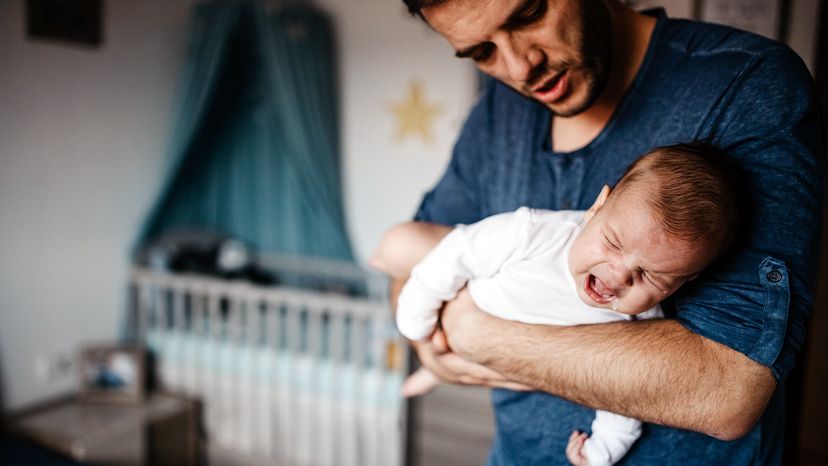 “Study after study has found that many new dads experience postpartum depression just like new moms. Anchiy
“Study after study has found that many new dads experience postpartum depression just like new moms. Anchiy
For some time, researchers and mental health experts have known that postpartum depression (PPD) is not something solely experienced by new moms. New dads, too, experience depression.
Brandon Eddy, an assistant professor in the Couple & Family Therapy Program at the University of Nevada, Las Vegas, has seen PPD from both parents’ point of view. He learned a little about PPD when his wife experienced it after the couple’s first child. Though he hasn’t suffered from it himself, he has studied how PPD affects men, too, and has written about it for a paper in the Feb. 27, 2019, edition of the Journal of Family Issues. It’s titled "Forgotten Fathers: Postpartum Depression in Men."
Already, Eddy’s hearing from many who applaud his efforts to force this illness more into the open.
"I had a former co-worker who read it and sent me a message. He said, ‘I really appreciated your study. I could really relate with it,’" Eddy says. "He said, ‘Everyone asks, How’s your wife? How’s the baby? And it ends there. I desperately want someone to ask, How are you doing?’"
The Earmarks of PPD
Many parents of new babies suffer through what’s colloquially known as the "baby blues." Mood swings, anxiety, trouble sleeping, a general sadness are all symptoms, according to the Mayo Clinic.
But when those moods become more intense and last longer, when overpowering fatigue sets in, when a parent has problems bonding with a newborn or has thoughts of suicide or harming the baby … those are all signs that postpartum depression has set in.
PPD can be especially difficult for men because of a widely held belief that it is a woman-only illness. Much of the available information on PPD is still aimed exclusively toward women. Even the National Institute for Mental Health defines PPD like this: "Postpartum depression is a mood disorder that can affect women after childbirth."
Yet a 2010 study shows that somewhere around 10 percent of dads — 25 percent in the three to six month period after birth — suffer through PPD. Eddy’s research cites another study that says that between 24 and 50 percent of men whose partners suffer from PPD also suffer from it. And that suffering can spread to the kids, too.
Men’s PPD is, according to Eddy’s paper, "an underscreened, underdiagnosed, and undertreated condition which creates considerable complications in families … Postpartum depression not only harms those experiencing it, but it also affects relationships with one’s partner and children."
Looking for Dads With PPD
With the dogged stigma that surrounds paternal PPD — "it’s for women only … men don’t get it … you didn’t carry a baby for nine months … just suck it up and be strong" — finding men willing to talk openly about their depression was not going to be easy. So Eddy and other researchers from Texas Tech, UNLV and BYU went to a source where anonymity rules and fathers felt free to speak their mind: the internet.
After conducting searches for phrases like "depression in new fathers," Eddy and his co-authors scoured chat boards, blogs and other forums like Reddit to pull information from 27 new dads.
"No one knows who they are, so there’s not that same sense of shame. It’s not like, ‘All eyeballs are upon you,’" Eddy says. "So sometimes that makes it a lot easier to share their experiences … These people were in a safe place where they were able to express themselves."
Eddy’s research uncovered six main themes from those online comments. They are (with comments from participants):
- Needing education: "It became clear that although they may not have known what to call it, many of them were living with paternal PPD."
- Adhering to gender expectations: "I wanted to cry and give up being a father. But I was afraid to acknowledge those thoughts and feelings in myself — it wasn’t becoming of a man and father to feel those things."
- Repressing feelings: "She’s with the kids every day all day and I’m home to help for six hours and can’t handle it?"
- Overwhelmed: "I have the feeling that I’m constantly on the edge of bursting into tears."
- Resentment of baby: "Baby cries can unearth some darkness in me, I’ve found."
- The experience of neglect: "I blamed both her [wife] and my son for my feelings of loss and insignificance. My wife seemed to consider me selfish and irresponsible."
"For me, my takeaway, what this all means," says Eddy, "is that transitioning to parenthood can be difficult. It’s rewarding … but there’s some challenges to being a parent."
Finding Help for Depressed Dads
Men who are feeling depressed after the birth of a child, Eddy says, need to know that the feelings they have are real, recognized by scientists and caused, some experts believe, at least in part by chemical changes in the body [see Now That’s Interesting]. They need to know that help is available.
A talk with a mental health practitioner might be the first step toward shaking PPD.
"The sooner you get help the better," Eddy says. "If you put this off … you’re going to have more distance grow between you and your partner. You’re going to isolate yourself. And you’re going to put yourself in a bad situation. So seeking out help as soon as you recognize something is off is really the way to go, and the way to limit how much it impacts you and your family."
NOW THAT’S INTERESTING
Postpartum depression in women has been tied to a dip in the hormone estrogen. But women aren’t alone in dealing with falling hormone levels. Men suffer a drop in testosterone from early to late pregnancy, and that’s been linked to depression, too. Perhaps strangely, dad’s plummeting testosterone level may be good for mom. According to one study, "[M]oms paired with low-testosterone men reported higher relationship satisfaction, and their higher relationship satisfaction predicted lower rates of [their own] depressive symptoms."































